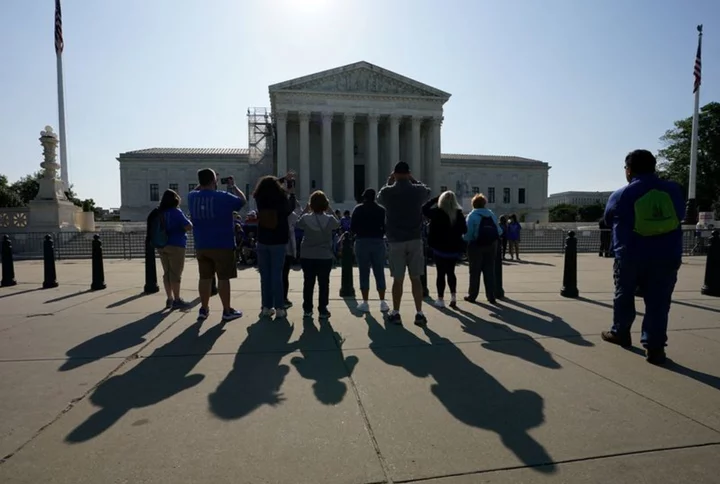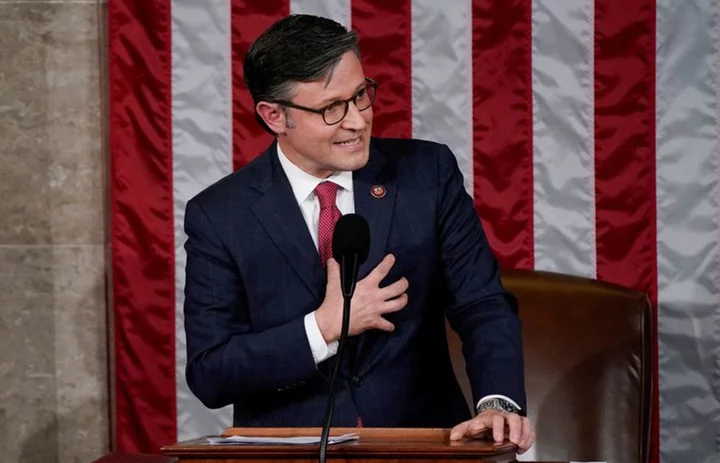The U.S. Supreme Court has issued a series of important rulings during its term that began last October on issues including affirmative action, student loans, free speech, LGBT rights, voting rights, immigration and environmental regulation.
Here is a look at some of the rulings issued by the court this term.
AFFIRMATIVE ACTION
The court on June 29 struck down race-conscious admissions programs at Harvard University and the University of North Carolina, effectively prohibiting affirmative action policies long used to raise the number of Black, Hispanic and other underrepresented minority students on American campuses. It ruled that affirmative action admissions programs that consider an applicant's race in ways like Harvard and UNC did violate the U.S. Constitution's promise of equal protection under the law.
FREE SPEECH AND LGBT RIGHTS
The court on June 30 dealt a blow to LGBT rights by ruling that the constitutional right to free speech allows certain businesses to refuse to provide services for same-sex weddings despite state anti-discrimination law. The Constitution's First Amendment allows an evangelical Christian web designer who objects on religious grounds to gay marriage to refuse to provide services for same-sex weddings, it found.
STUDENT LOANS
The justices on June 30 blocked President Joe Biden's plan to cancel $430 billion in student loan debt. The court invoked the "major questions" doctrine, a muscular judicial approach that gives judges broad discretion to invalidate executive agency actions of "vast economic and political significance" unless Congress clearly authorized them.
VOTING RIGHTS
The justices on June 8 handed a major victory to Black voters who challenged a Republican-drawn electoral map in Alabama, finding the state violated a landmark law prohibiting racial discrimination in voting and paving the way for a second U.S. House of Representatives district with a Black majority or close to it. The court elected not to further roll back protections contained in the Voting Rights Act as it had done in two major rulings in the past decade.
ELECTION POWERS
The court on June 27 rebuffed a legal theory favored by many conservatives that could have given state legislatures sweeping power to set voting rules and draw electoral district boundaries for federal elections by preventing state courts from reviewing their actions. The ruling against Republican state legislators stemmed from a legal fight over their map of North Carolina's 14 U.S. House districts.
ENVIRONMENTAL REGULATION
The court on May 25 further limited the regulatory reach of the U.S. Environmental Protection Agency, embracing a stringent new test for declaring wetlands protected under a landmark federal anti-pollution law in a ruling favoring an Idaho couple who challenged the EPA. The new test could leave wide swathes of sensitive wetlands and tributaries unprotected by the Clean Water Act, the landmark 1972 anti-pollution law.
IMMIGRATION ENFORCEMENT
The justices on June 23 gave the Biden administration the green light to move ahead with guidelines shifting immigration enforcement toward countering public safety threats, handing the Democratic president a victory in a legal battle with Texas and Louisiana. The guidelines reflected Biden's recalibration of U.S. immigration policy after the hardline approach taken by his Republican predecessor Donald Trump.
ENCOURAGING ILLEGAL IMMIGRATION
A federal law that makes it a crime for a person to encourage illegal immigration does not violate constitutional free speech protections, the court ruled on June 23, upholding the decades-old measure defended by the Biden administration. A lower court had ruled that the law was overly broad because it may criminalize speech protected by the U.S. Constitution's First Amendment.
PROTECTIONS FOR INTERNET COMPANIES
The court on May 18 left legal protections for internet and social media companies unscathed and refused to clear a path for victims of attacks by militant groups to sue these businesses under an anti-terrorism law. In both cases, families of people killed by Islamist gunmen overseas had sued to try to hold internet companies liable because of the presence of militant groups on their platforms or for recommending their content.
NATIVE AMERICAN ADOPTION
The justices on June 15 upheld decades-old federal requirements that give preferences to Native Americans and tribal members in the adoption or foster care placements of Native American children. The court found that the plaintiffs, including the state of Texas, did not have legal standing to challenge parts of the law they claimed were racially biased against non-Native Americans.
RELIGIOUS ACCOMMODATION
The court on June 29 bolstered the ability of employees to obtain workplace accommodations for their religious practices, reviving a lawsuit by an evangelical Christian former mail carrier accusing the Postal Service of discrimination after being disciplined for refusing to show up for work on Sundays.
LABOR UNIONS
The justices on June 1 made it easier for employers to sue over strikes that cause property destruction - handing another setback to organized labor - in a ruling siding with a concrete business in Washington state that sued the union representing its truck drivers after a work stoppage.
CORRUPTION PROSECUTIONS
The court on May 11 further restricted the ability of federal prosecutors to pursue corruption cases, overturning the bribery conviction of Joseph Percoco, an ex-aide to Democratic former New York Governor Andrew Cuomo, and former construction company executive Louis Ciminelli.
STALKING LAW
The justices on July 27 threw out the stalking conviction of a Colorado man who for two years sent a barrage of unwanted Facebook messages to a female musician in a case involving free speech protections under the Constitution's First Amendment. The court ruled that state prosecutors had not shown that he was aware of the "threatening nature" of his statements.
(Compiled by John Kruzel and Andrew Chung; Editing by Will Dunham)









